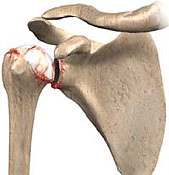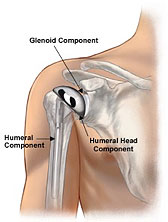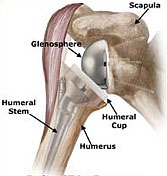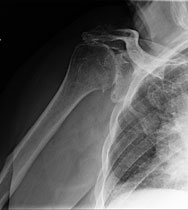Shoulder Replacement
Shoulder replacement surgery is also known as Total Shoulder Arthroplasty.
How does this happen?
Arthritis is a degenerative condition that causes loss of cartilage in the joints. The most common form of arthritis is Osteoarthritis, also known as Degenerative Joint Disease, and represents normal wear and tear of joints associated with aging. Degeneration of the joints may also be from Rheumatoid Arthritis, an inflammatory condition, or Post-Traumatic Arthritis, where degenerative changes occur following trauma or broken bones. Degeneration of the shoulder joint can also occur as a result of Cuff Tear Arthropathy. Cuff Tear Arthropathy if the final result of a massive rotator cuff tear that has been present for a very long time. Without a rotator cuff, the ball slides up in the socket and there is increased movement between the ball and the socket. Over time the cartilage wears away. This leads to pain and stiffness in the shoulder, and the inability to raise the arm overhead.

Normal Shoulder

Shoulder Arthritis
How will we know that this is your problem?
The diagnosis of shoulder arthritis is usually made by a combination of your history of when your shoulder hurts, stiffness in the shoulder, and pain in the joint on examination. When a large rotator cuff tear is present and Cuff Tear Arthropathy is suspected, you will also have trouble raising your arm overhead. The diagnosis can be confirmed in the office with routine X-rays of the shoulder and Magnetic Resonance Imaging (MRI). Your doctor may also order a CT scan for additional information.
How can this be treated?
The initial treatment of arthritis consists of medications, exercise, and activity modification. Medications such as Non-Steroidal Anti-Inflammatory Drugs (NSAIDs) such as ibuprofen or naproxen help to control the pain. Exercise and Physical Therapy can help to regain motion, prevent stiffness, strengthen muscles, and control body weight. Activity modification may be recommended with avoidance of certain activities that aggravate the condition and cause pain. If pain is not controlled with anti-inflammatory medication, cortisone injections may be helpful. Cortisone is a strong anti-inflammatory medication in liquid form. Injection of cortisone into a joint can decrease the inflammation and help to alleviate pain. Ice and heat may be helpful.
When all conservative measures fail to provide relief, surgery may be recommended. Arthroscopic surgery aimed at removing bone spurs and smoothing of frayed cartilage usually only provides temporary relief for Cuff Tear Arthropathy. Reverse Shoulder Replacement is offered as an operation that has the best chance of providing long-term pain relief and restoring overhead function.
Total Shoulder Arthroplasty includes replacing both sides of the joint with a metal ball and a plastic socket in order to create a smooth joint surface and painless range of motion. A traditional shoulder replacement requires a functioning rotator cuff to provide stability to the prosthesis as well as the ability to raise the arm overhead. When the rotator cuff is torn or not functioning, such as in Cuff Tear Arthropathy, then a traditional shoulder replacement will not work because it will wear out and loosen over time. A Reverse Shoulder Replacement uses a more constrained design, and allows the shoulder to function without a rotator cuff. Reverse Shoulder Replacement surgery has been shown in studies to give a very reproducible result with improved motion, better function, and less pain.




Dr. Michael O’Brien treats shoulder arthritis, and patients of all ages with this condition. Dr. O’Brien performs surgery for arthritis, including shoulder replacements. He offers a wide range of surgical reconstruction, including Hemiarthroplasty for young active patients, Total Shoulder Arthroplasty, and Reverse Shoulder Arthroplasty for patients with arthritis and large rotator cuff tears. Dr. O’Brien is fellowship-trained in Shoulder and Elbow Reconstruction, and trained specifically in Reverse Shoulder Replacement. He has excellent results performing Reverse Shoulder Replacement and aim to get their patients back to the activities they enjoy with a painless, functional shoulder.
The Tulane Institute of Sports Medicine offers on-site X-Ray and MRI, as well as its own Physical Therapy department with licensed physical therapists, in order to ease your visit and speed your recovery.
